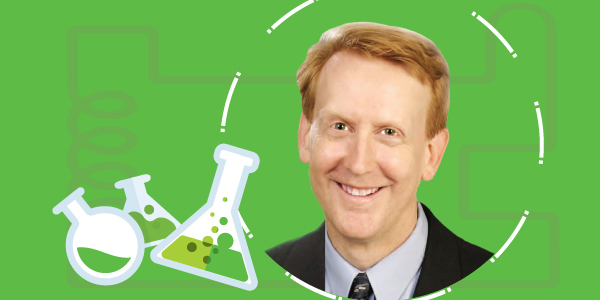Frankenstein Friday: Dr. Gunderman Scholar Essay
February 23, 2018As part of One State / One Story: Frankenstein, scholars from colleges and universities across the Hoosier state have contributed short essays on Shelley’s remarkable novel. These essays provide important…
As part of One State / One Story: Frankenstein, scholars from colleges and universities across the Hoosier state have contributed short essays on Shelley’s remarkable novel. These essays provide important contexts and insightful reflections on the implications of Shelley’s text in her own time and beyond. This week’s essay, “Frankenstein and the Missing Mother” was contributed by Dr. Richard Gunderman of Indiana University Bloomington and provides perspective on the creation scene from chapter 4.

Read:
Essay: “Frankenstein and the Missing Mother”Dr. Richard GundermanIndiana University
Mary Shelley had many reasons to be concerned with motherhood and the consequences of motherlessness. Her mother, Mary Wollstonecraft, one of the greatest feminists ever to write in the English language, had died from complications arising from her daughter’s birth. Shelley’s own attempts at motherhood resulted in miscarriages and the deaths of three children before producing her only offspring, son Percy, who survived to adulthood.
Mothers in Frankenstein lead short lives. Victor Frankenstein’s mother, Caroline, herself an orphan who is taken in by his father, dies of scarlet fever while nursing Victor’s “cousin” and eventual wife, Elizabeth. Assuming Caroline’s maternal duties, Elizabeth later marries Victor before being killed by the monster on their honeymoon. Justine, the Frankenstein’s’ housekeeper who is falsely convicted of the murder of Victor’s younger brother, had also grown up motherless.
Frankenstein’s most dramatic instance of motherlessness is the monster itself, the first human being ever created without a woman. Reflecting on this feat, Victor remarks that “no father could claim the gratitude of his child so completely” as he would deserve that of the new race of creatures he was creating. Simply put, he had devised a new way of bestowing life that completely side-stepped the need for conception, pregnancy, and childbirth.
Yet he had not done away entirely with the need for maternity. For though he had “selected the creature’s features as beautiful,” the moment he beholds it stirring, he recoils in horror. “The beauty of the dream vanished, and breathless horror and disgust filled my heart.” Unbound by any maternal affection or calling, he is “unable to endure the aspect of the being I had created,” and rushes out of the room. Perhaps in part because his creation was never part of him, he feels at liberty to abandon it.
The roots of the problem lie largely in the fact that Victor has moved procreation from the domain of the natural – the purview of Mother Nature – to that of the technological. His quest is a purely scientific one – a study of chemistry, anatomy, and the decay of the human body so completely devoid of any regard for the sacred that he came to regard a churchyard as nothing more than a “receptacle of bodies deprived of life.”
To him, there is nothing mysterious about life and death. The animation of lifeless matter looms before him as nothing more than a daunting but purely technical challenge. He dreams of the power “to renew life,” and becomes so engrossed in this one pursuit that his eyes “become insensible to the charms of nature,” including the unfolding of the seasons around him. A “single great object” swallows up “every habit of his nature.”
What long reigned as one of the most mysterious and awe-inspiring experiences in human life – the birth of a human being – has in Victor’s mind become little more than proof of his own greatness: “I was surprised, that among so many men of genius who had directed their enquiries toward the same science, I alone should be reserved to discover so astonishing a secret.” To Victor, the act of creation is less about the creature than the creator.
Devoid of the feminine, bringing forth new life becomes a completely masculine act, an exercise of mastery and control over a reluctant but ultimately compliant nature. Victor’s cold detachment from his creation contrasts sharply with the experience of childbirth as described by those who have been through it – a description not of conquest but endurance, and the unfolding of something that cannot be controlled.
Consider this description of labor by the 20th century activist Dorothy Day in her essay, “Having a Baby – A Christmas Story”:
“Where before there had been waves, there were now tidal waves. Earthquake and fire swept my body. My spirit was a battleground on which thousands were butchered in a most horrible manner.
It is not difficult to imagine Day having just read Frankenstein’s account of bringing forth new life when she penned these lines about men giving birth:
‘What do they know about it, the idiots?’ I thought. And it gave me pleasure to imagine one of them in the throes of childbirth. How they would groan and holler and rebel. And wouldn’t they make everybody else miserable around them?”
In Day’s account, gestation and parturition are not like pushing buttons on a control panel but an experience along which the mother is swept, something she does not so much choose as endure. And when it is over, she is presented with a baby fashioned less by her than in her and through her. The form of the baby, from its sex to its features, is a joyful surprise even to the woman who has served as the locus of its development over three-quarters of a year.
For Victor, the process is quite different. He too is surprised, but his surprise reflects the fact that, although he has in fact painstakingly selected each of the creature’s features, the whole turns out radically different from what he envisioned. He thought every aspect of the creature was subject to his control, but instead of a superman he has produced a monster. His horror is magnified by the fact that his creature is a product, while Dorothy Day’s daughter is a gift.
Thanks to Frankenstein, we can pose a question that would have seemed nonsensical throughout most of the course of human history: What does a mother add? The answer, in simplest terms, is that mothers add to life something that Victor Frankenstein – who treats the whole process of creation as nothing more than a challenge to his own ingenuity – is unable even to recognize, let alone to wield: the power of a love that puts creature before creator.
Victor has made something new, but it was never a part of him, and from the moment he lays eyes on it he seeks to disassociate himself from it completely. Because the creature’s appearance disappoints him, he feels within his rights to turn his back on it – to abandon it to a world utterly unprepared to receive it. The circumstances of the creature’s birth may be monstrous, but it is not yet a monstrosity. Only by depriving it of any semblance of love does Victor create a true monster.
Think:
- In what ways could it be argued that Victor Frankenstein is a poor mother (or parent) to the creature?
- What threats does motherlessness pose to human beings?
Talk:
Find out how Frankenstein is coming to life in your own community
! Organizations throughout Indiana are offering book discussions, read-a-thons, hands-on activities, film screenings and more exploring the big ideas at the heart of Frankenstein. Subscribe to FrankenNews for updates about how Frankenstein is coming alive for Hoosiers in 2018! Share your thoughts on social media using #itsalive.
One State / One Story: Frankenstein is an Indiana Humanities program and has been made possible in part by a major grant from the National Endowment for the Humanities and in partnership with the Indiana State Library and Indiana Center for the Book. Any views, findings, conclusions, or recommendations expressed in this program do not necessarily represent those of the National Endowment for the Humanities.


